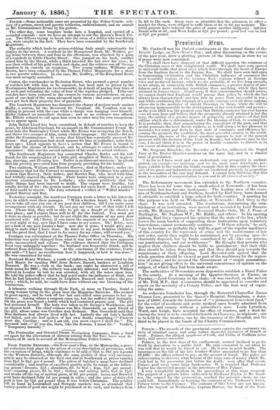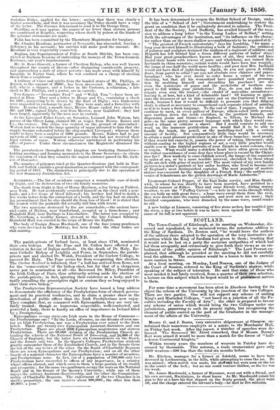ronintial .311ttug.
Mr. Cardwell met his Oxford constituents at the annual dinner of the Druids' Lodge, on New-Year's Day ; and after discoursing on the events of the past year, drew a glowing picture of the blessings in store for us if peace were now concluded.
We shall then have disposed of that difficult question the relations of the Christian races of this enlightened world. We shall have seen opened to universal traffic that great river which flows through the heart of Europe from the Suabian forest to the Euxino Sea. We shall have seen laid open to humanizing civilization and the Christian influence of commerce the most beautiful regions of the teeming East—regions related in Grecian tales and mediaeval history, which we are probably, if we live long enough, to see attain, in connexion with British commerce, a greater degree of use- fulness and a more enduring reputation than anything which they have attained in former times. Gentlemen, if that consummation should arrive, we cannot doubt that England would pursue that policy by which she has always been characterized not less first in peace than successful in war ; and while continuing the triumph of a pacific courage over all those regions, where she is the mediator of untold blessings to them, while she will be advancing immeasurably to the development of her own wealth and power— as the year 1853 was the greatest year that British commerce has ever known —so we may hope and believe that the prosperity already attained is but the type, the outline of a greater degree of prosperity and power—of that full outline which she is determined, under the blessing of God, to accomplish. It is probable, then, that remembering the experience of the past, and that as she possesses the most heroic soldiers, so it will always be her pleasure to maintain her army and fleets in that state of constancy and of be- coming the greatest, the wealthiest, the most powerful country in the world. Gentlemen, the issue of the great question appears to rest at the present moment with the decision of the Czar in Russia ; but whatever may be the case, I do not think it is in thepower of hostile countries to disturb us in our career of domestic progress."
Mr. Sergeant Kingiake, the Recorder of Exeter, addressed the Ormid Jury at the Exeter Quarter-sessions on the same day, and in a similar tone of gratulation. " As far as I have read and can understand, our prosperity is undimi- nished, our energies are untiring ; and we do, amid sonic drawbacks, per- haps, exhibit to the world the bright example that in this country the ener- gies of its great and industrious people are awakened precisely ui proportion RS the necessities of the case may demand. I cannot help thinking that this must be a matter of congratulation to you and to all classes of society."
The Reformatory movement has extended to the Northern counties. There has been for some time a small school at Newcastle : it has been successful, but has become inadequate. The leading men of the coun- ties of Northumberland and Durham, headed by Earl Grey, have deemed it advisable to establish a large school for both counties. A meeting for this purpose was held on Wednesday, at Newcastle ; Earl Grey in the chair. It was well attended, The resolutions, determining the esta- blishment of an institution, were moved and seconded by Lord Ravens- worth, Mr. Hodgson Hinde, the Reverend Shafto Orde, Mx. J. Pease of Darlington Mr. Ingham M.P. Mr. Riddle, and others. In his opening address, Earl Grey expressed his opinion that the state of the law which leaves the main burden of supporting these institutions upon voluntary benevolence, cannot permanently continuo. " If these schools," he said, " are to become, as probably they will do, a part of the regular machinery of this country for the repression of crime and the maintenance of law and order, surely they ought to be maintained, not by pressing upon the charitably disposed, but by funds contributed by all—like our prisons, our penitentiaries, and our workhouses." He thought- that parents who neglect their children should be liable to punishment ; that their chil- dren should be taken from them, and that they should pay towards the maintenance of their offspring. Lord Ravensworth agreed that the whole question should be viewed as part of the machinery for the repres- sion of crime ; and he accused the Government of " stupid proesastina- tion " in not giving effect to the universal concurrence of opinion on the subject, of which they had been made aware.
The authorities of Devonshire seem disposed to establish a Rural Police in the county. At a meeting of the Quarter-Sessions at Exeter, on Tuesde,y—Lord Courtenay in the ebstir —it was resolved, on the motion of Mr. Palk M.P., that a committee should be appointed to consider and report on the necessity of a County Police, and the best way of organ- izing the same.
An unknown benefactor has, through the Reverend Chancellor James. Thomas Law, presented to the Queen's Hospital, Birmingham, a dona- tion of 10001. towards the formation of " a permanent benevolent fund," for the relief of accidents and acute medical eases hourly admitted from the town and county without a subscriber's note. Lords Lyttelton, Ward, and Leigh, have accepted the office of trustees, and a deed de- claring the trust is to be enrolled forthwith in Chancery, in triplicate ; one to be held by the trustees, one by the treasurer of the Hospital, and the third to be placed in the hands of the Charity Commissioners.
Porters.—The records of the provincial courts contain the customary va- riety of criminal cases, and some rather shameful instances of breach of trust. Palmer, the alleged murder., of Cook, and Palin, of Cudham noto- riety, still attract thsoudon.
Palmer, in the first days of his confinement, seemed inclined to prefer death by starvation to a public trial. He only consented to eat when he was told that he would be forced to eat. He is now in good health. The insurances on the life of his late brother Walter amounted to no less than 23,4501.: the offices refused to pay, on the ground of fraud. The police are endeavouring to discover what became of the large sum of money which Mr. Cook had in his possession just before his death : soon after that event, Palmer paid away some large bank-notes. It is reported that Professor Taylor has discovered arsenic in the intestines of Mrs. Palmer. A very remarkable incident in the proceedings at this stage occurred.. The purport of a private letter addressed by Professor Taylor to Mr. Gard- ner, the counsel for the prosecution, reached the prisoner—how, no one could tell. Immediately on learning the contents of the Professor's letter, Palmer wrote to the Coroner. The contents of this letter are not known. After the inquest on Wednesday, Captain Hatton, the head of the Staf-
fordshire Police, applied for the letter ; saying that there was clearly a traitor somewhere, and that it was necessary the Police should have a copy of the letter. The Coroner determined to send it to Sir George Grey. Startling as it may appear, the names of no fewer than sixteen persons are mentioned at Rugeley, respecting whose death by poison at the hands of the prisoner statements are made.
Palin has been committed by the Thornbury Magistrates for burglary.
Mr. Charles Headlam; postmaster of Newcastle, has absconded, leaving a deficiency in his accounts : his sureties will make good the amount. Mr. Headlam is very respectably connected.
Buglaas, late Superintendent of Police at South Shields, has been con- victed at Durham Sessions of embezzling the moneys of the Town-Council. Sentence, one year's imprisonment.
Mr. G. Rowe Guscott, a fanner of Cheriton Bishop, who was well known throughout the county of Devonafter dissipating considerable property, and approaching a state of abject poverty—has made away with himself by hanging, in Exeter Gaol, where he was confined on a charge of stealing sheep from a neighbour.
A robbery of wines and spirits from the bonded stores of Mr. Phillips, at Bristol, to the amount of 20001., has been discovered. Mr. Stephen Ben- doll, who is a shipper, and a locker in the Customs, a celkunian, a late clerk to Mr. Phillips, and a porter, are in custody.
Two forgers—" Devonshire Fred" and " Welsh Tom "—have been ar- rested at Eton. They sent a letter to Hoare and Co., containing a check for 1001., purporting to be drawn by the Earl of Digby ; two bank-notes were requested in exchange by post. They were sent, and a Detective with them. It seems that, a month since, Messrs. Hoare cashed two cheeks for 501. and 1001., signed Digby, sent from Merrow, near Guildford : they had been forged, apparently by the men now in custody.
At the Liverpool Police Court, on Saturday, Leonard John Watson, late purser of the Oliver Lang, claimed 501. as wages from Messrs. Baines and Co. the owners. The claim was resisted on the ground of misconduct : Watson had so wasted the large quantity of sugar intrusted to him that the supply became exhausted before the ship reached Liverpool.; whereas there ought to have been a surplus of 1000 pounds. Messrs. Baines had to pay upwards of 3501. as compensation to passengers who had not received their legal rations of sugar. Watson otherwise misbehaved in performing his office of purser. Under these circumstances the Magistrate dismissed the claim.
The pawnbrokers throughout the kingdom are bestirring themselves— holding meetin's and framing memorials to the Home Secretary—to obtain the remission of what they consider the unjust sentence passed on Mr. Jack- son of Doncaster.
The number of prisoners tried at the Quarter-Sessions just held in Nor- folk and Suffolk exhibits a great diminution as compared with the correspond- ing period of 1855. The diminution is principally due to the operation of the new Summary Jurisdiction Act.
Aecmaxvs.—The list of accidents comprises a remarkable case of death by fright, and the destruction of two old family mansions.
The death from fright is that of Henry Harrison, a boy living at Fulford, near York. He had accidentally scratched himself the chest with a pen- knife, and a few drops of blood followed; his brother had bled to death a few weeks before from the extraction of a tooth, and the boy had an absorb- ing presentiment that he also should die from loss of blood : it is stated that the scratch with the penknife did actually kill him with terror.
The two mansions destroyed by fire are remarkable,—the ancient baro- nial castle of Hylton, near Sunderland, occupied as a farm-house • and Stainfield Hall, near Barlings in Lincolnshire. The latter was occupied by Mr. Greetham, a wealthy farmer, steward to the late Colonel Sibthorp. Stainfield Hall was erected in the reign of Henry the Eighth.
The body of Ensign Ames Macdonell, one of the four young gentlemen who were drowned in the Medway, has been found : the other bodies are still missing.











































 Previous page
Previous page